June 2, 2025 | 08:44 GMT +7
June 2, 2025 | 08:44 GMT +7
Hotline: 0913.378.918
June 2, 2025 | 08:44 GMT +7
Hotline: 0913.378.918
Since the beginning of 2022, many uncommon natural disasters in the world have damaged countries' life quality and economy. For example, the earthquake in Turkey caused severe damage, with about 53,000 deaths and economic losses of over 105 billion USD (according to data on February 6, 2023).
Concurrently, we have witnessed the most substantial snowstorm in 100 years in 20 western and central US states (February), widespread wildfires in Chile, severe floods and landslides in Brazil, and extreme heat waves in China, India, etc.
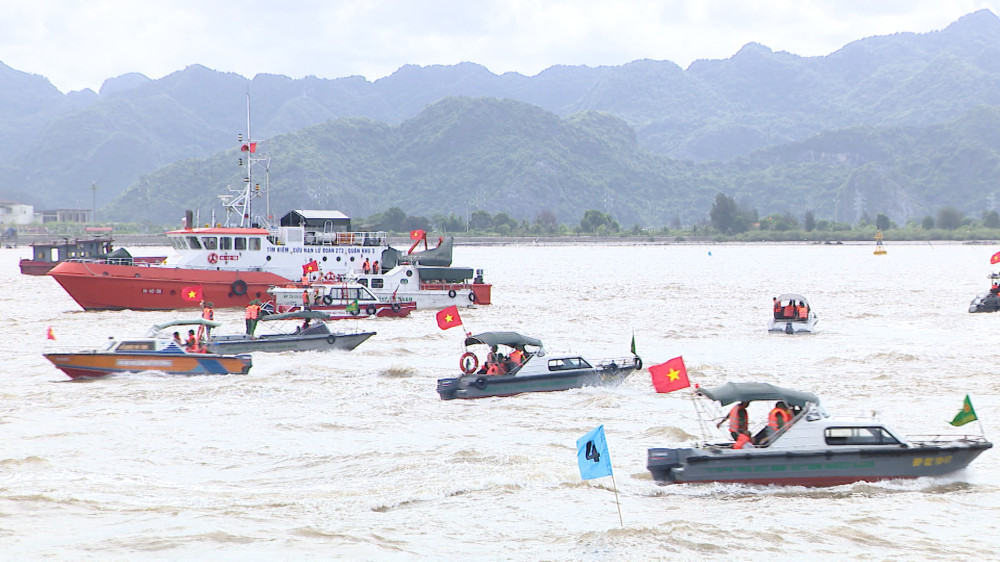
A drill with more than 1,300 participants to counter super typhoons was held in Hai Phong on July 7, 2023. Photo: Dinh Muoi.
Since the beginning of the year, Vietnam has been affected by 19 over 22 types of natural disasters. As of July 5, natural disasters have caused 49 deaths or missing, 36 injuries, and economic losses of more than 308 billion VND.
ASEAN is one of the most disaster-prone regions in the world. According to data from the United Nations Economic and Social Commission for Asia and the Pacific, natural disasters, including floods, storms, heatwaves, droughts, and even earthquakes and tsunamis, have caused countries in the region to suffer an average annual economic loss of up to 86.5 billion USD.
From 2012 to 2020, at least nearly 3,000 natural disasters occurred in Southeast Asia, including some large-scale storms such as Typhoon Bopha (2012) in the Philippines; Typhoon Haiyan (2013) in the Philippines; Central Sulawesi earthquake and tsunami (2018) in Indonesia, Typhoon Mangkhut (2018) in the Philippines and Typhoon Damrey (2017) in Vietnam.
As one of the fastest developing regions in the world with rapid urbanization and population growth, Southeast Asia is also facing natural environment degradation and climate change, making the region increasingly vulnerable to natural disasters that are increasing in intensity and frequency.
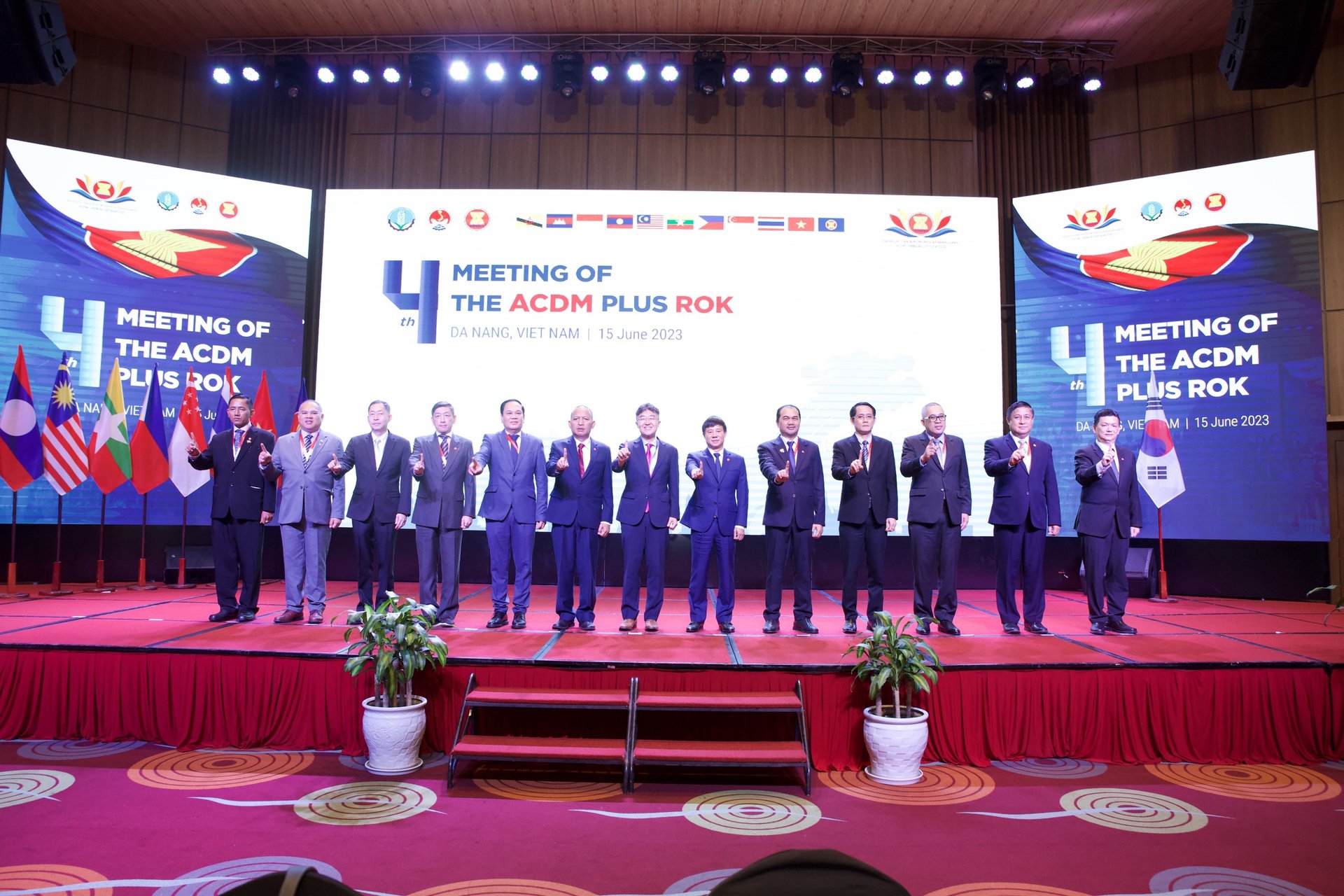
ASEAN countries commit to cooperate in disaster management.
In such a context, cooperation between ASEAN member countries in disaster management has become a focal point in multidisciplinary and multisectoral commitments in the region and with stakeholders outside the area.
Natural disaster prevention is also one of ASEAN’s top priorities to achieve the goals of the Sendai Framework of Action on disaster risk reduction as well as the 2030 sustainable development goals.
Vietnam has proved our role as an active and trustworthy member of ASEAN, in which ASEAN cooperation on Disaster Management is a focus of ASEAN cooperation in the socio-cultural pillar.
Currently, the Ministry of Agriculture and Rural Development (MARD) is the lead agency actively participating in activities under the ASEAN Agreement on Disaster Management and Emergency Response and the Agreement on Establishing the ASEAN Regional Coordination Center for Humanitarian Assistance in Disasters (AHA Center).
In the order of rotation among ASEAN countries, in 2023, Vietnam acts as the Chairman of the ASEAN Committee on Disaster Management (ACDM), hosting the 11th ASEAN Ministerial Meeting on Disaster Management and related meetings of ACDM and AHA Center, etc.
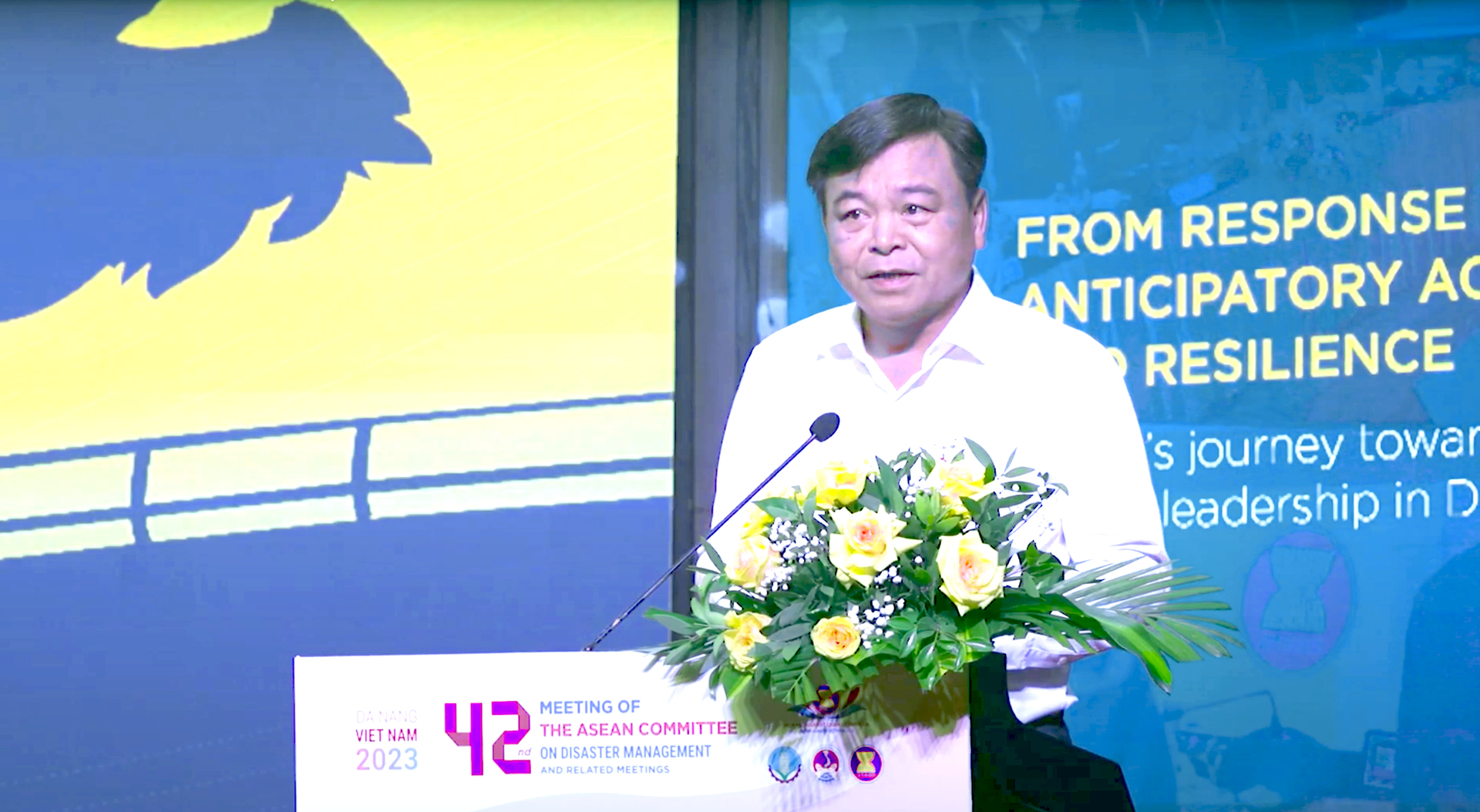
Mr. Nguyen Hoang Hiep – MARD Deputy Minister and Deputy Head of the National Steering Committee for Natural Disaster Prevention and Control – delivers the opening speech at the 42nd ASEAN Committee Meeting on Disaster Management in Da Nang.
Hosting a major forum on disaster management in ASEAN is Vietnam’s responsibility, which also helps the host country to improve its role, role, prestige, and position regionally and internationally. At the same time, it welcomes the international community to support Vietnam’s disaster prevention and control, actively contributing to building a resilient ASEAN habitat and contributing to national development.
As the Chairman of ACDM in 2023, Vietnam implements the Agreement on Disaster Management and Emergency Response. MARD thereby acts as the Chairman of the 11th ASEAN Ministerial Meeting on Disaster Management, Chairman of the 12th Conference of the Parties to the Agreement on Disaster Management and Emergency Response, Chairman of the ASEAN Ministerial Meeting on Disaster Management + Korea, ASEAN Ministerial Meeting on Disaster Management + China, ASEAN Ministerial Meeting on Disaster Management + Japan, and Chairman of AHA Center Administration.
Primarily, meetings, conferences, and activities under Vietnam’s chairmanship in 2023 will focus on reviewing and evaluating the progress of implementing the Agreement on Disaster Management and Emergency Response Work Program from 2021 to 2025.
Participants will also discuss adjustments, advise, and help operate the AHA Center Fund to assist ASEAN member states in disaster response and propose priority activities.
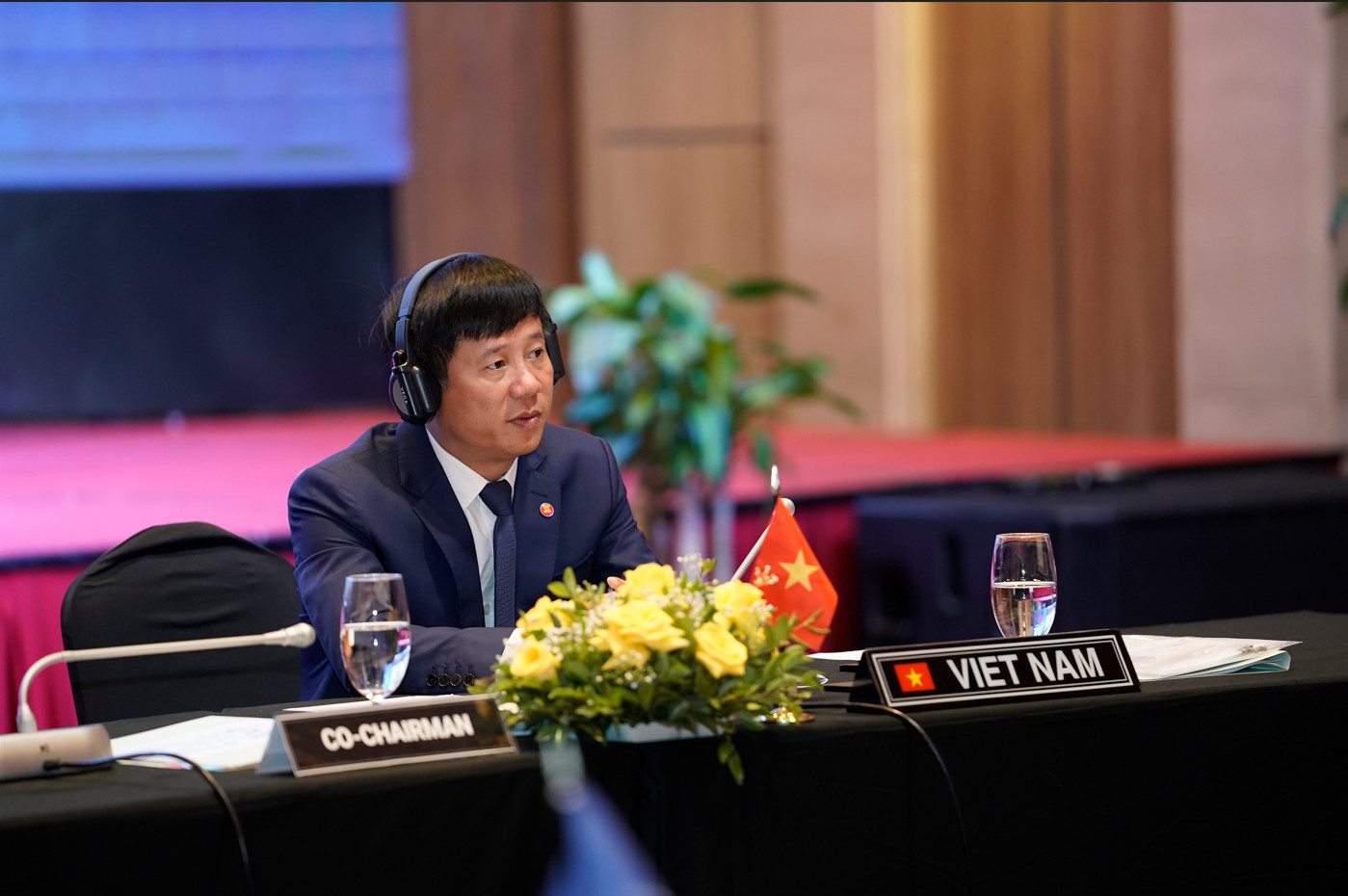
Mr. Pham Duc Luan – Director of the Department of Dike Management and Disaster Prevention and Chief of the Office of the National Steering Committee for Natural Disaster Prevention and Control – co-chairs the meeting of the 5th annual ASEAN Committee on Disaster Management (ACDM) + China on June 15 in Da Nang. Photo: NH.
Some prioritized tasks include mobilizing resources to support the implementation of the Agreement on Disaster Management and Emergency Response Work Program, coordinating the response to major disasters in the region as Chairman of the 2023 ACDM, and cooperation with China, Japan and Korea.
To carry out the tasks above, MARD will coordinate with the ASEAN Secretariat, the AHA Center, and ASEAN member states to organize a series of technical meetings on disaster management in 2023 in Vietnam to implement the Agreement on Disaster Management and Emergency Response.
Mr. Nguyen Hoang Hiep – MARD Deputy Minister and Deputy Head of the National Steering Committee for Natural Disaster Prevention and Control – states, based on Vietnam’s proposal, ASEAN disaster management agencies have agreed to this year’s cooperation, which is “From immediate response to early action and resilience: ASEAN towards global leadership in disaster management.”
Deputy Minister Nguyen Hoang Hiep scrutinizes that, although the term “early action” is a relatively new concept for our country, it essentially denotes activities in natural disaster prevention and immediate response. In natural disaster prevention, agencies and organizations have implemented this term in activities such as forecasts, early warning, or risk analysis before natural disasters.
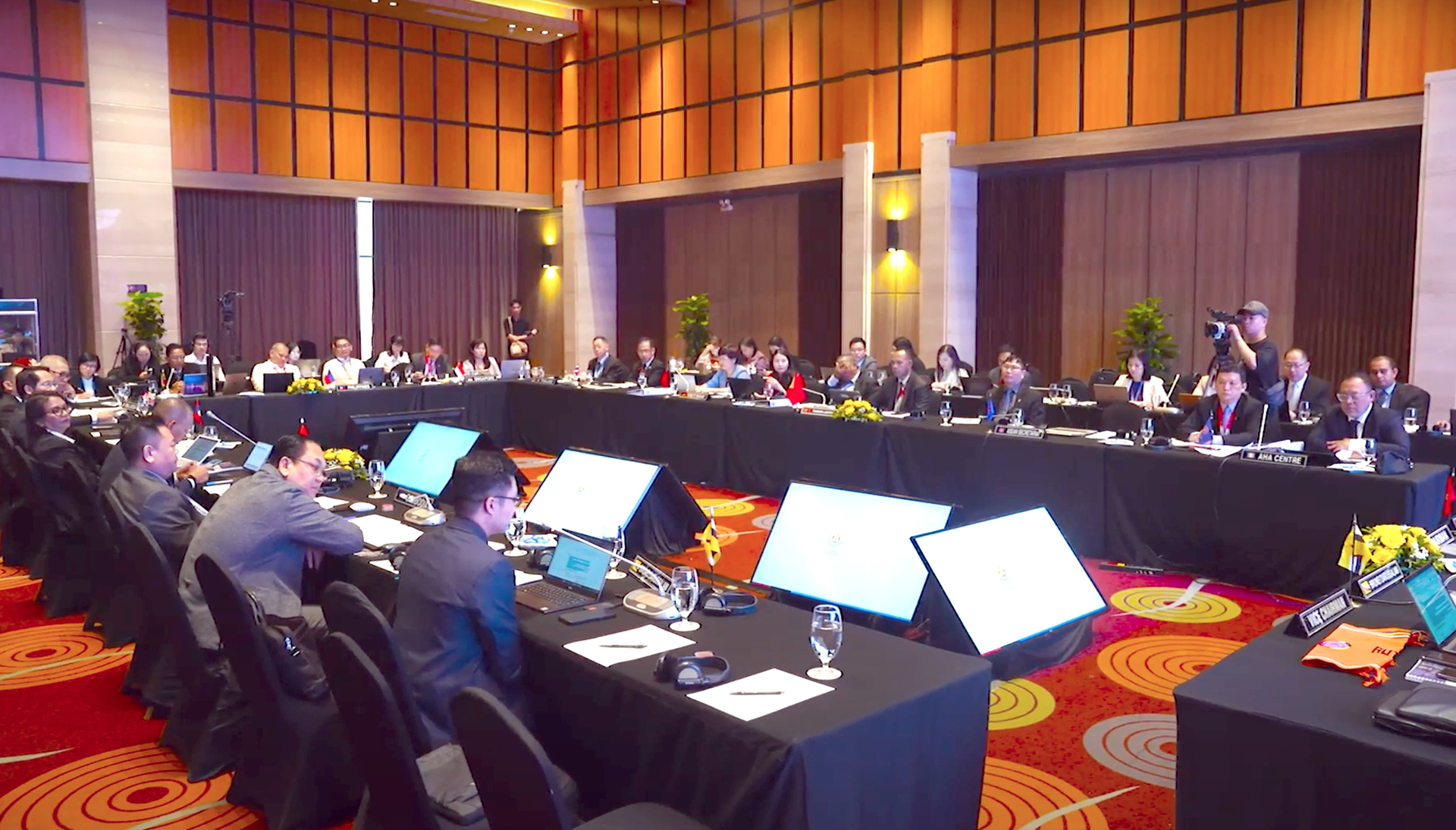
The 42nd ASEAN Committee on Disaster Management and related activities bring up many important topics regarding disaster response and disaster risk reduction. Photo: NH.
“The key to disaster management is to focus on collective action before disasters happen. It also means acting immediately to halt the progress of climate change; act together, change the way of doing things, and aim for community stability before natural disasters,” Deputy Minister Nguyen Hoang Hiep shared.
The Deputy Head of the National Steering Committee for Disaster Prevention also emphasized that when Vietnam is Chairman of ACDM in 2023, we have an excellent opportunity to cooperate with other countries to build a stronger and more resilient ASEAN community even in the most challenging times.
Mr. Nguyen Do Anh Tuan – Director of the International Cooperation Department (MARD) – states: “The proposal ‘From immediate response to early action and resilience: ASEAN towards global leadership in disaster management’ demonstrates Vietnam’s leading role and responsibility in promoting ASEAN cooperation in disaster management. This is a focal point in the pillar of socio-cultural cooperation among ASEAN countries.”
Regarding the need for strengthening disaster management at the 42nd ACDM and related activities from June 13 to 15 in Da Nang recently, Thailand’s Minister of Interior Anupong Paochinda (country representative to act as ACDM Chairman in 2022) states:
“ASEAN is currently facing major challenges and risks regarding regional and global natural disasters. As of 2021, the region recorded 16 major natural disasters with serious consequences. Then the brutal Covid-19 pandemic made the region more vulnerable. This context poses an urgent need to provide information on disaster management, prevention, and guidelines for people to approach this issue.”
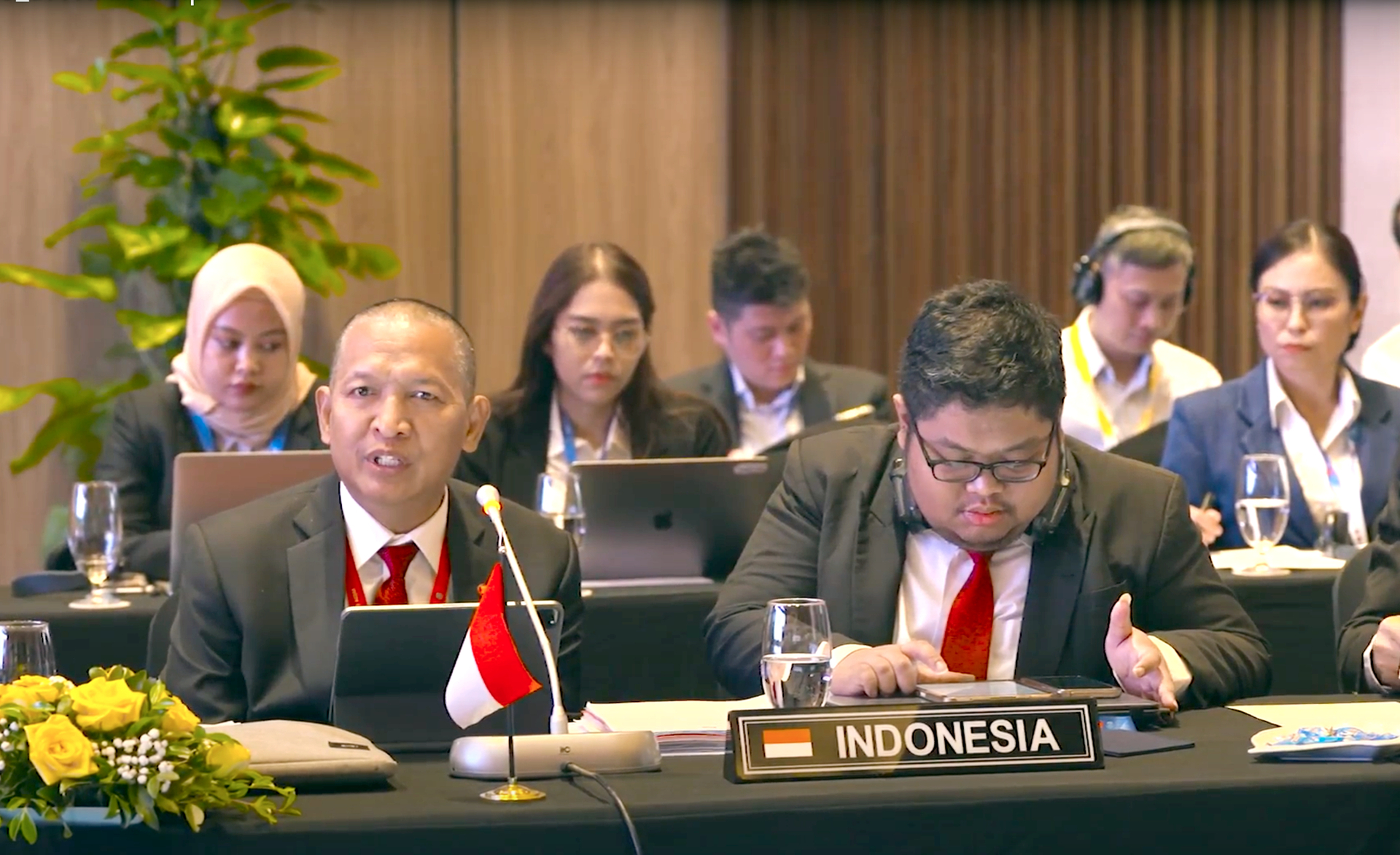
Delegates attending the 42nd ASEAN Committee on Disaster Management Conference.
The year 2023 marks the 20th anniversary of the ASEAN Committee on Disaster Management. Two decades ago, the predecessors took the first step towards forming the ACDM, which established Disaster Management Offices in all member states in the ASEAN, thereby providing strategic direction to strengthen cooperation in disaster management regionally.
Prominent is the ASEAN Coordinating Centre for Humanitarian Assistance on Disaster Management (AHA Centre, established in 2011), focusing on three main activities: disaster monitoring, disaster prevention, and capacity building for member countries.
Notable achievements of the AHA Center include relief operations during the earthquake in Indonesia and tropical storms and floods in the Philippines, Myanmar, and the Mekong region. Most recently, the center has supported several ASEAN countries in responding to the Covid-19 pandemic by relieving goods from the ASEAN stockpile and mobilizing donations from other countries.
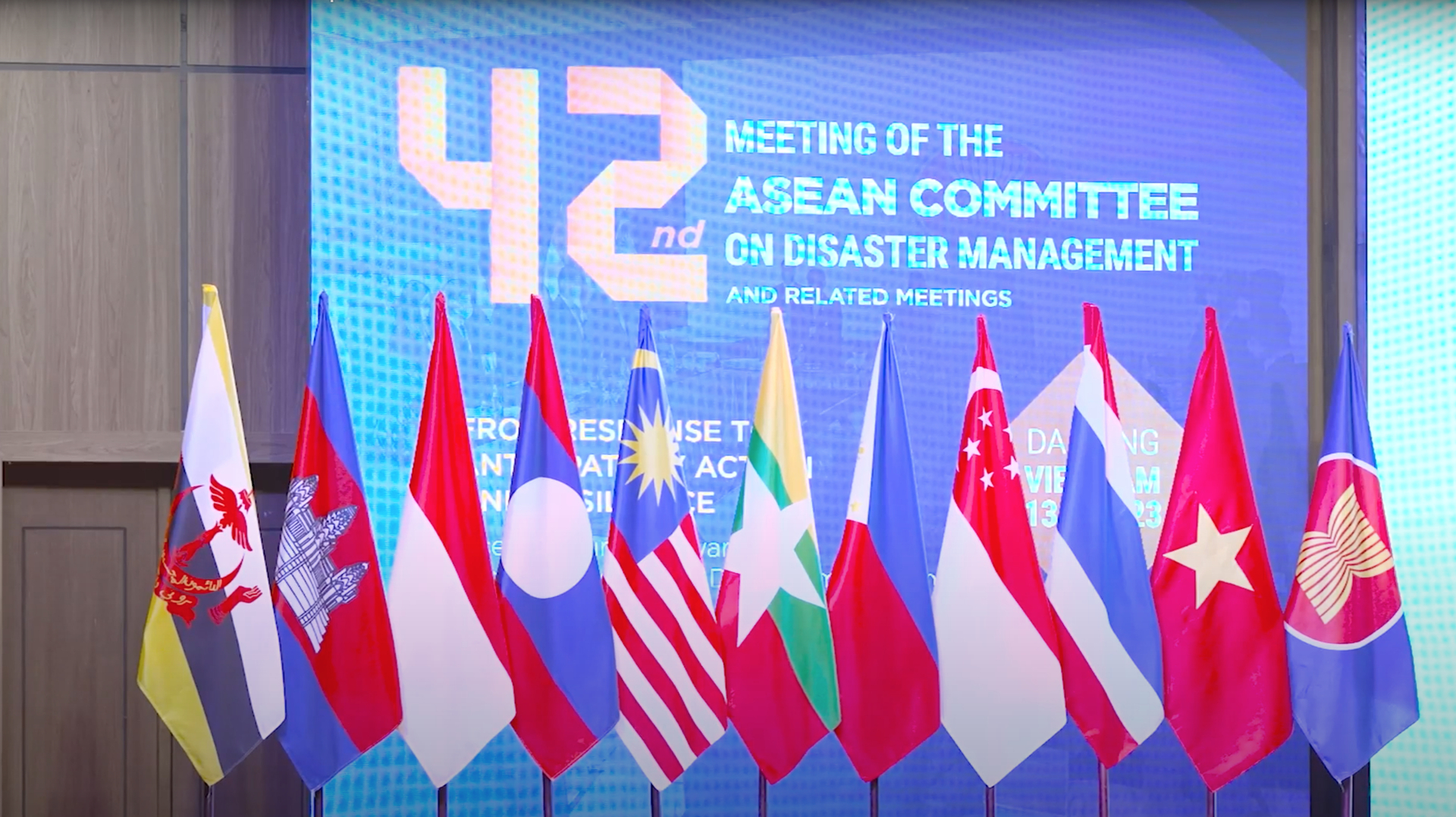
The year 2023 marks the 20th anniversary of the ASEAN Committee on Disaster Management.
At the meeting, the delegates discuss the preparation of the ASEAN Agreement’s program on disaster management and emergency response for the 2021-2025 period; reviewing, developing and implementing documents as well as direction on regional cooperation in disaster management, such as the regional strategy on disaster recovery from 2023 to 2024 and the ASEAN youth initiative on a disaster-resilient region. At the same time, delegates call for a regional drill on emergency response to natural disasters in 2023 in Indonesia.
Previously, on June 14 afternoon, the 3rd ASEAN Forum on Disaster Resilience (ADRP) was held, co-chaired by ACDM Vietnam representative (ACDM 2023 Chairman) – Mr. Nguyen Van Tien, Deputy Director of the Department of Dike Management and Disaster Prevention – and representatives of ACDM Brunei, ASEAN Negotiation Department, Director of ASEAN Socio-Cultural Cooperation.
The delegates discuss many important issues together. They update the progress of disaster management-related activities initiated by ASEAN sectoral agencies and the progress of ADRP key activities, such as the first ASEAN Forum on Disaster Resilience (ADRF); pilot project on ASEAN Disaster Resilience Community to apply Whole-of-ASEAN approach; progress of intersectoral activities among ASEAN agencies; common challenges in resilience and potential areas of cooperation.
The ASEAN Forum on Disaster Resilience (ADRP) was established further to promote the “whole-of-ASEAN” approach to disaster management. The first ADRP meeting, held on June 23, 2021, issued the ADRP’s terms of reference. ADRP’s role is to promote synergy and coordination among ASEAN sectoral agencies, ASEAN centers, dialogue partners, intersectoral partners, development partners of ASEAN, The United Nations, and non-ASEAN disaster management organizations, all aim to enhance ASEAN’s capacity for early disaster action.
Translated by: Quynh Chi

(VAN) A delegation of nearly 50 Vietnamese agencies, agribusinesses, and agricultural associations has officially begun its working trip to the United States.
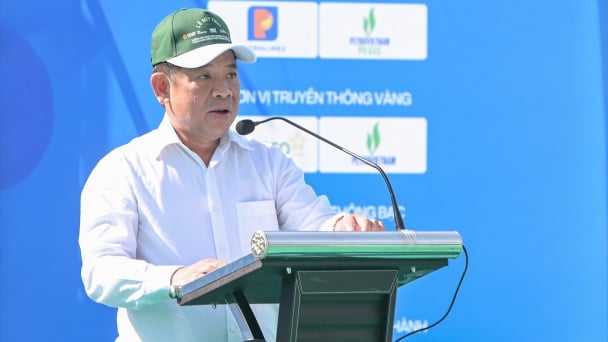
(VAN) Mr. Van Ngoc Thinh, CEO of WWF-Vietnam, warned that plastic waste is the starting point of a chain of ecological degradation and the decline of coastal livelihoods.

(VAN) Quang Ninh’s leaders have affirmed that the province was one of the first localities in the country to launch a province-wide campaign against plastic waste.
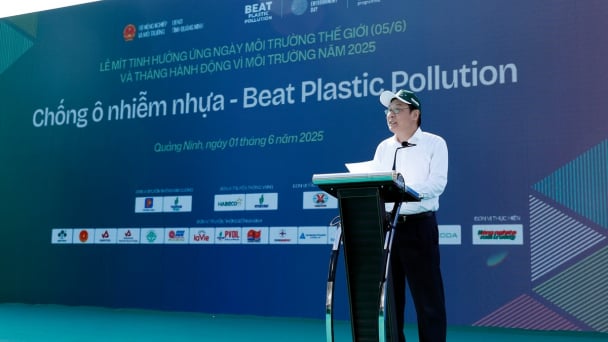
(VAN) Vietnam launches a campaign to reduce plastic waste, aiming for a green lifestyle and a circular economy, joining hands to protect the environment.
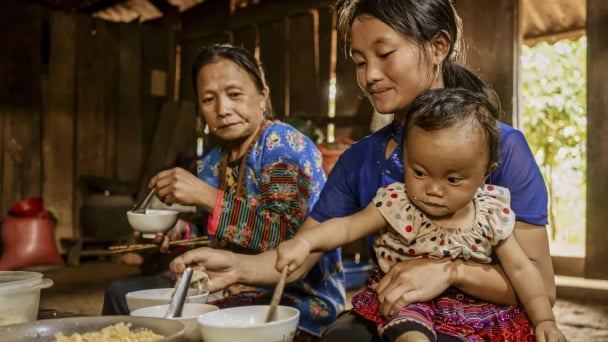
(VAN) 30 experts in health, agriculture and environment participated in a consultation workshop to inform the development of a methodological framework aimed at supporting Vietnam’s transition to a sustainable food system.

(VAN) Over the past five years, Quang Ninh Province has vigorously and synchronously implemented the ‘Say No to Plastic Waste’ campaign, yielding positive outcomes in advancing sustainable tourism.

(VAN) The prevention of plastic pollution necessitates collaboration among governments, businesses, and citizens. Today's little things contribute to a future free of plastic.